| Listing 1 - 10 of 20 | << page >> |
Sort by
|
Book
ISBN: 9783110266115 Year: 2011 Publisher: Berlin De Gruyter
Abstract | Keywords | Export | Availability | Bookmark
 Loading...
Loading...Choose an application
- Reference Manager
- EndNote
- RefWorks (Direct export to RefWorks)
Grammar, Comparative and general --- Tense. --- Grammar --- Grammaire comparée --- Temps (linguistique) --- Grammaire comparée
Book
ISBN: 9789027259370 9789027267610 9027267618 9027259372 Year: 2016 Volume: 172 Publisher: Amsterdam John Benjamins Pub Company
Abstract | Keywords | Export | Availability | Bookmark
 Loading...
Loading...Choose an application
- Reference Manager
- EndNote
- RefWorks (Direct export to RefWorks)
Grammar --- 801.56 --- 801.56 Syntaxis. Semantiek --- Syntaxis. Semantiek --- Functionalism (Linguistics) --- Grammar, Comparative and general --- Fonctionnalisme (Linguistique) --- Temps (Linguistique) --- Aspect (Linguistique) --- Tense. --- Aspect. --- Functionalism (Linguistics). --- Tense --- Aspect --- Grammar, Comparative and general - Tense --- Grammar, Comparative and general - Aspect
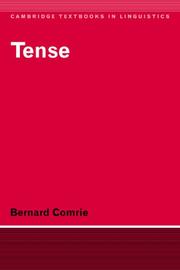
ISBN: 0521281385 9780521281386 9780521236522 0521236525 9781139165815 113916581X Year: 2000 Publisher: Cambridge Cambridge University press
Abstract | Keywords | Export | Availability | Bookmark
 Loading...
Loading...Choose an application
- Reference Manager
- EndNote
- RefWorks (Direct export to RefWorks)
Bernard Comrie defines tense as the grammaticalisation of location in time. In this textbook he introduces readers to the range of variation found in tense systems across the languages of the world, bringing together a rich collection of illustrative material that student and specialist alike will find invaluable. This systematic account of the data is carefully integrated with a theoretical discussion of tense that is sensitive both to the range of tense oppositions found cross-linguistically and also to the constraints on that variation. For the most part the book is written without formalism, nor is it written within the framework of any specific current theory of linguistics. Nevertheless, as the final chapter makes clear, a formal theory of tense can build upon the insights gained here. For all readers, Dr Comrie's coherent and characteristically elegant account of this complex grammatical category will provide a solid basis for further research on tense, even in a language as thoroughly studied as English.
Grammar, Comparative and general --- Tense (Grammar) --- Tense --- Temporal constructions --- Grammar --- Tense. --- Werkwoorden --- vervoeging. --- Temps (Linguistique) --- Grammar [Comparative and general ] --- Vervoeging. --- Arts and Humanities --- Language & Linguistics --- Linguistics --- Philology --- Grammar, Comparative and general - Tense
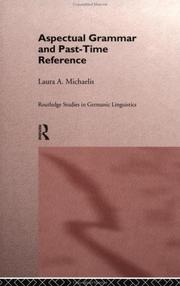
ISBN: 0415156785 9780415156783 9780203029985 9781134730025 9781134730063 9781134730070 9780415653602 0415653606 0203276051 0203029984 1280330805 9780203276051 1134730063 Year: 1998 Volume: 4 Publisher: London Routledge
Abstract | Keywords | Export | Availability | Bookmark
 Loading...
Loading...Choose an application
- Reference Manager
- EndNote
- RefWorks (Direct export to RefWorks)
This study presents a semantic framework for analyzing all aspectual constructions in terms of the event state distinction, and describes the grammatical expression of aspectual meaning in terms of a theory of grammatical constructions. In this theory, grammatical constructions, like words, are conventionalized form-meaning pairs, which are best described not only with respect to their intrinsic semantic values, but also with respect to the functional oppositions in which they participate.
English language --- Grammar --- Espace et temps dans la langue --- Espace et temps dans le langage --- Expression de l'espace et du temps (Linguistique) --- Langage -- Expression de l'espace et du temps --- Ruimte en tijd in de taal --- Space and time in language --- Temps et espace dans le langage --- Grammar, Comparative and general --- Space and time in language. --- Aspect (Linguistique) --- Temporalité (Linguistique) --- Temps (Linguistique) --- Aspect. --- Temporal constructions. --- Tense. --- 801.56 --- Syntaxis. Semantiek --- 801.56 Syntaxis. Semantiek --- Temporalité (Linguistique) --- Language and languages --- Tense (Grammar) --- Temporal constructions (Grammar) --- Aspect (Linguistics) --- Aspect --- Temporal constructions --- Tense --- Syntax --- Verbal aspect --- Verb --- Grammar [Comparative and general ] --- Linguistics --- Philology

ISBN: 044485732X 9780444857323 Year: 1991 Volume: 144 Publisher: Amsterdam Noord-Hollandsche
Abstract | Keywords | Export | Availability | Bookmark
 Loading...
Loading...Choose an application
- Reference Manager
- EndNote
- RefWorks (Direct export to RefWorks)
Chaucer, Geoffrey --- Lexicology. Semantics --- Pragmatics --- Grammar, Comparative and general --- Temps (Linguistique) --- Tense --- Congresses --- Congrès --- Discourse analysis --- Congresses. --- -Discourse grammar --- Text grammar --- Semantics --- Semiotics --- Conferences - Meetings --- -Comparative grammar --- Grammar --- Grammar, Philosophical --- Grammar, Universal --- Language and languages --- Philosophical grammar --- Linguistics --- Philology --- -Congresses --- Grammar, Comparative --- -Tense --- Congrès --- Comparative grammar --- Tense&delete& --- Grammar, Comparative and general - Tense - Congresses. --- Discourse analysis - Congresses

ISBN: 9782801113660 2801113662 Year: 2005 Volume: *27 Publisher: Bruxelles De Boeck-Duculot
Abstract | Keywords | Export | Availability | Bookmark
 Loading...
Loading...Choose an application
- Reference Manager
- EndNote
- RefWorks (Direct export to RefWorks)
French language --- Psycholinguistics --- Grammar --- Franse taalkunde --- Linguistique française --- Cognitive grammar --- Tense --- Temporal constructions --- Modalité (linguistique) --- Temps (linguistique) --- Linguistique cognitive --- 804.0-56 --- Frans: syntaxis; semantiek --- Cognitive grammar. --- Temporal constructions. --- Tense. --- 804.0-56 Frans: syntaxis; semantiek --- Langue d'oïl --- Romance languages --- Cognitive linguistics --- Grammar, Comparative and general --- Linguistique cognitive. --- French language - Tense --- French language - Temporal constructions --- Acqui 2006

ISBN: 0792338014 9048146402 9401586098 Year: 1996 Volume: 58 Publisher: Dordrecht Kluwer Academic
Abstract | Keywords | Export | Availability | Bookmark
 Loading...
Loading...Choose an application
- Reference Manager
- EndNote
- RefWorks (Direct export to RefWorks)
Temps (Linguistique) --- Grammar, Comparative and general --- Semantics --- 801.56 --- Formal semantics --- Semasiology --- Semiology (Semantics) --- Comparative linguistics --- Information theory --- Language and languages --- Lexicology --- Meaning (Psychology) --- 801.56 Syntaxis. Semantiek --- Syntaxis. Semantiek --- Tense (Grammar) --- Syntax --- Tense --- Temporal constructions --- Lexicology. Semantics --- Grammar --- Syntaxe --- Sémantique --- Grammar [Comparative and general ] --- Linguistics --- Philology --- Grammar, Comparative and general Syntax
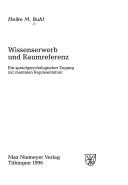
ISBN: 3484303573 3110929678 Year: 1996 Volume: 357 Publisher: Tübingen Niemeyer
Abstract | Keywords | Export | Availability | Bookmark
 Loading...
Loading...Choose an application
- Reference Manager
- EndNote
- RefWorks (Direct export to RefWorks)
Die Arbeit ist der Kognitiven Linguistik zuzuordnen. Ihr Gegenstand sind sprachliche Lokalisationen. Bekannte Einflußgrößen auf Lokalisationen sind die räumliche Anordnung, über die gesprochen wird, und die Bedürfnisse des Gesprächspartners. Daneben wirken ganz wesentlich auch der Wissenserwerb und die mentale Raumrepräsentation des Sprechers. Diese Zusammenhänge werden am Beispiel des Blickpunkts in sprachlichen Lokalisationen aufgezeigt. Ein erster Teil bietet eine Einführung zu den kognitiven Grundlagen der mentalen Raumrepräsentation. Es werden psychologische Theorien und Untersuchungen zu räumlichem Wissen in Form von kognitiven Karten und Vorstellungsbildern erörtert. Im Zentrum steht der Einfluß des Wissenserwerbs auf die mentale Repräsentation und besonders die Blickpunktinformation. Ein zweiter Teil befaßt sich aus sprachpsychologischer Sicht mit der Raumreferenz in Form von Lokalisationen. Es wird aufgezeigt, welche Blickpunktbelegungen möglich sind (von mir aus gesehen ..., von dir aus gesehen ... usw.). Besonders für Lokalisationen mittels Richtungspräpositionen werden Einflüsse auf die Blickpunktwahl beschrieben. Im dritten Teil der Arbeit wird mit empirischen Untersuchungen der Bedeutung der mentalen Raumrepräsentation und des Wissenserwerbs auf sprachliche Lokalisationen nachgegangen. In einer Serie von fünf Experimenten erwarben Versuchspersonen räumliches Wissen und wurden dann im Rahmen einer Wegauskunft zu sprachlichen Lokalisationen aufgefordert. Es zeigt sich ein deutlicher Effekt des Wissenserwerbs auf den Blickpunkt der Lokalisationen. Der Wissenserwerb beeinflußt die Lokalisationen sogar stärker als die Bedürfnisse des Kommunikationspartners. Diesem Befund kommt Bedeutung sowohl für die mentale Raumrepräsentation als auch für den Sprachproduktionsprozeß zu.
Psycholinguistics --- Espace et temps dans la langue --- Espace et temps dans le langage --- Expression de l'espace et du temps (Linguistique) --- Langage -- Expression de l'espace et du temps --- Ruimte en tijd in de taal --- Space and time in language --- Temps et espace dans le langage --- Mental representation --- Language and languages --- Language, Psychology of --- Psychology of language --- Speech --- Linguistics --- Psychology --- Thought and thinking --- Representation, Mental --- Abstraction --- Perception --- Psychological aspects --- Psycholinguistics. --- Space and time in language. --- Mental representation. --- DEUTSCHE SPRACHE --- PSYCHOLINGUISTIK --- SPRACHERWERB --- RAUMREFERENZ
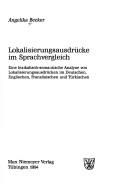
ISBN: 3484303166 9783484303164 Year: 1994 Volume: 316 Publisher: Tübingen Niemeyer
Abstract | Keywords | Export | Availability | Bookmark
 Loading...
Loading...Choose an application
- Reference Manager
- EndNote
- RefWorks (Direct export to RefWorks)
French language --- English language --- German language --- Lexicology. Semantics --- Turkish language --- Comparative linguistics --- Espace et temps dans la langue --- Espace et temps dans le langage --- Expression de l'espace et du temps (Linguistique) --- Langage -- Expression de l'espace et du temps --- Ruimte en tijd in de taal --- Space and time in language --- Temps et espace dans le langage --- Grammar, Comparative and general --- Locative constructions. --- Grammar, Comparative and general - Locative constructions. --- German language - Locative constructions. --- English language - Locative constructions. --- French language - Locative constructions. --- Turkish language - Locative constructions.
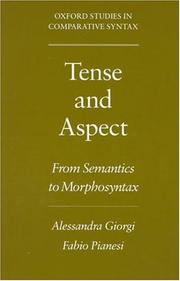
ISBN: 0195091930 0195091922 0195357884 1280527625 1429415495 9781429415491 9780195091939 9780195091922 9786610527625 6610527628 9781280527623 9780195357882 9780195091922 0197722601 Year: 1997 Volume: *7 Publisher: New York Oxford University Press
Abstract | Keywords | Export | Availability | Bookmark
 Loading...
Loading...Choose an application
- Reference Manager
- EndNote
- RefWorks (Direct export to RefWorks)
The authors bridge the gap between the semantic and syntactic properties of verb tense and aspect, suggest a unified account of tense and aspect using Chomsky's Principles and Parameters Framework and compare tense and aspect systems in Romance languages with Germanic ones. In the OXFORD STUDIES IN COMPARATIVE SYNTAX series.
Lexicology. Semantics --- Grammar --- Semantics --- Semantiek --- Sémantique --- Sémasiologie --- Grammar, Comparative and general --- Semantics. --- Germanic languages --- Romance languages --- Temps (Linguistique) --- Aspect (Linguistique) --- Syntaxe --- Tense. --- Aspect. --- Syntax. --- Grammar, Comparative --- Romance --- Germanic --- 801.56 --- Syntaxis. Semantiek --- Romance. --- Germanic. --- 801.56 Syntaxis. Semantiek --- Sémantique --- Aspect (Linguistics) --- Teutonic languages --- Indo-European languages --- Tense (Grammar) --- Language and languages --- Syntax --- Formal semantics --- Semasiology --- Semiology (Semantics) --- Comparative linguistics --- Information theory --- Lexicology --- Meaning (Psychology) --- Neo-Latin languages --- Italic languages and dialects --- Grammar, Comparative&delete& --- Aspect --- Tense --- Verbal aspect --- Temporal constructions --- Verb --- Grammar [Comparative and general ] --- Grammar [Comparative ] --- Germanic languages - Grammar, Comparative - Romance. --- Romance languages - Grammar, Comparative - Germanic. --- Linguistics --- Philology --- Grammar, Comparative and general Syntax --- Grammar, Comparative and general.
| Listing 1 - 10 of 20 | << page >> |
Sort by
|

 Search
Search Feedback
Feedback About UniCat
About UniCat  Help
Help News
News